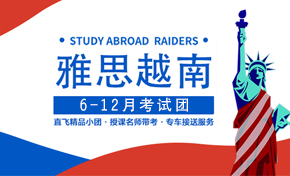2014年7月26日雅思考试阅读单项()预测真题及答案2014.7.26
2014年07月22日 01:15
供稿单位:互联网 责编:新航道小编 浏览 0次
供稿单位:互联网 责编:新航道小编 浏览 0次
2014年7月26日雅思考试很快就要到了,成都新航道小编特为大家收集整理了雅思阅读真题预测供大有练习,同学们可以用做参考,希望有帮到大家
2014年7月26日雅思考试很快就要到了,成都新航道小编特为大家收集整理了雅思阅读真题预测供大有练习,同学们可以用做参考,希望有帮到大家。
阅读真题一:
In the earliest stages of man's development he had no more need of money than animals have. He was content with very simple forms of shelter, made his own rough tools and weapons and could provide food and clothing for himself and his family from natural materials around him. As he became more civilized, however, he began to want better shelter, more efficient tools and weapons, and more comfortable and more lasting clothing than could be provided by his own neighborhood or by the work of his own unskilled hands. For these things he had to turn to the skilled people such as smiths, leather workers or carpenters. It was then that the question of payment arose.
At first he got what he wanted by a simple process of exchange. The smith who had not the time to look after land or cattle was glad to take meat or grain from the farmer in exchange for an axe or a plough. But as more and more goods which had no fixed exchange value came on the market, exchange became too complicated to be satisfactory. Another problem arose when those who made things wanted to get stocks of wood or leather, or iron, but had nothing to offer in exchange until their finished goods were ready.
Thus the difficulties of exchange led by degrees to the invention of money. In some countries easily handled things like seeds or shells were given a certain value and the farmer, instead of paying the smith for a new axe by giving him some meat or grain, gave him so many shells. If the smith had any shells left when he had bought his food, he could get stocks of the raw materials of his trade. In some countries quite large things such as cows or camels or even big flat stones were used for trade. Later, pieces of metal, bearing values according to the rarity of the metal and the size of the pieces, or coins were used. Money as we know it had arrived.
1. Exchange of goods became difficult because_________.
A man became more civilized
B smiths began to look after land or cattle in their spare time
C more and more goods which had no fixed exchange values came to the marker
D farmers hadn't enough grain or meat to provide for skilled workers
2. Money was not used until_______.
A paper was invented
B people practiced a simple process of exchange
C nothing could be offered in exchange
D the exchange of one thing for another became too complicated
3. The best title for this passage is_____.
A What is money
B What are money's functions.
C The importance of money
D The beginning of money
注释:
1. stage阶段;时期at an early stage in our history
在我们的历史早期
(前面与the连用)演员生涯;剧院工作;戏剧工作行程,旅程
to travel by easy stages从容旅行
2. content n.内容,容量,目录,满足adj.满足的,满意的,愿意vt.使满足
We should never content ourselves with a little book knowledge only.我们切不可满足于仅仅有一点点书本知识。
3. shelter n.掩蔽处,身避处,掩蔽,保护,庇护所,掩体v.掩蔽,躲避
He stood in the shelter at the bus stop.他站在公共汽车站的候车亭里。
4. smith n.铁匠,金属品工匠
leather n.皮革,皮革制品
carpenter n.木匠
5. axe or plough斧或犁
6 complicate使复杂化,使错综加重(疾病)使混乱,难做、难懂;使恶化
be complicated in卷入……(的麻烦中)
Don't complicate life for me!不要为我把生活搞复杂了!
答案:1 C2 D3 D
阅读真题二:
Selling Digital Music without Copy-protection Makes Sense
A.It was uncharacteristically low-key for the industry's greatest showman. But the essay published this week by Steve Jobs, the boss of Apple, on his firm’s website under the unassuming title"Thoughts on Music" has nonetheless provoked a vigorous debate about the future of digital music, which Apple dominates with its iPod music-player and iTunes music-store. At issue is"digital rights management"(DRM)—the technology guarding downloaded music against theft. Since there is no common standard for DRM, it also has the side-effect that songs purchased for one type of music-player may not work on another. Apple's DRM system, called FairPlay, is the most widespread. So it came as a surprise when Mr. Jobs called for DRM for digital music to be abolished.
B.This is a change of tack for Apple. It has come under fire from European regulators who claim that its refusal to license FairPlay to other firms has"locked in" customers. Since music from the iTunes store cannot be played on non-iPod music-players(at least not without a lot of fiddling), any iTunes buyer will be deterred from switching to a device made by a rival firm, such as Sony or Microsoft. When French lawmakers drafted a bill last year compelling Apple to open up FairPlay to rivals, the company warned of"state-sponsored piracy". Only DRM, it implied, could keep the pirates at bay.
C.This week Mr. Jobs gave another explanation for his former defence of DRM: the record companies made him do it. They would make their music available to the iTunes store only if Apple agreed to protect it using DRM. They can still withdraw their catalogues if the DRM system is compromised. Apple cannot license FairPlay to others, says Mr Jobs, because it would depend on them to produce security fixes promptly. All DRM does is restrict consumer choice and provide a barrier to entry, says Mr Jobs; without it there would be far more stores and players, and far more innovation. So, he suggests, why not do away with DRM and sell music unprotected?"This is clearly the best alternative for consumers," he declares,"and Apple would embrace it in a heartbeat."
D.Why the sudden change of heart? Mr Jobs seems chiefly concerned with getting Europe's regulators off his back. Rather than complaining to Apple about its use of DRM, he suggests,"those unhappy with the current situation should redirect their energies towards persuading the music companies to sell their music DRM-free." Two and a half of the four big record companies, he helpfully points out, are European-owned. Mr Jobs also hopes to paint himself as a consumer champion. Apple resents accusations that it has become the Microsoft of digital music.
E.Apple can afford to embrace open competition in music players and online stores. Consumers would gravitate to the best player and the best store, and at the moment that still means Apple's. Mr Jobs is evidently unfazed by rivals to the iPod. Since only3% of the music in a typical iTunes library is protected, most of it can already be used on other players today, he notes.(And even the protected tracks can be burned onto a CD and then re-ripped.) So Apple's dominance evidently depends far more on branding and ease of use than DRM-related"lock in".
F.The music giants are trying DRM-free downloads. Lots of smaller labels already sell music that way. Having seen which way the wind is blowing, Mr Jobs now wants to be seen not as DRM's defender, but as a consumer champion who helped in its downfall. Wouldn't it lead to a surge in piracy? No, because most music is still sold unprotected on CDs, people wishing to steal music already can do so. Indeed, scrapping DRM would probably increase online-music sales by reducing confusion and incompatibility. With the leading online store, Apple would benefit most. Mr Jobs's argument, in short, is transparently self-serving. It also happens to be right.
Questions1-7Do the following statemets reflect the claims of the writer in Reading Passage1?
Write your answer in Boxes1-7 on your answer sheet.
TRUE if the statement reflets the claims of the writer
FALSE if the statement contradicts the claims of the writer
NOT GIVEN if it is impossbile to say what the writer thinks about this
1. Apple enjoys a controlling position in digital music market with its iPod music-player and iTunes music-store.
2. DRM is a government decree issued with a purpose to protect downloaded music from theft by consumers.
3. Lack of standardization in DRM makes songs bought for one kind of music player may not function on another.
4. Apple has been criticized by European regulators since it has refused to grant a license FairPlay to other firms.
5. All music can be easily played on non-iPod music devices from Sony or Microsoft without too much fiddling.
6. Apple depends far more on DRM rather than branding for its dominance of the digital music devices.
7. If DRM was cancelled, Sony would certainly dominate the international digital music market.
Questions8-10Choose the appropriate letters A-D and write them in boxes8-10 on your answe sheet.
8. Which of the following statements about Mr. Jobs'idea of DRM is NOT TRUE?
A. DRM places restrictions on consumer'choice of digital music products available.
B. DRM comples iTunes buyers to switch to a device made by Sony or Microsoft.
C. DRM constitutes a barrier for potential consumers to enter digital music markets.
D. DRM hinders development of more stores and players and technical innovation.
9. The word"unfazed" in line3 of paragraph E, means___________.
A. refused
B. welcomed
C. not bothered
D. not well received
10. Which of the following statements is TRUE if DRM was scapped?
A. Sony would gain the most profit.
B. More customers would be“locked in”.
C. A sudden increase in piracy would occur.
D. Online-music sales would probably decrease.
Questions11-14Complete the notes below.
Choose NO MORE THAN THREE WORDS from Reading Passage1 for each answer.
Write your answers in boxes11-14 on your answer sheet.
Mr. Steve Jobs, the boss of Apple, explains the reason why he used to defend DRM, saying that the company was forced to do so: the record companies would make their music accessible to…11...only if they agreed to protect it using DRM; they can still…12…if the DRM system is compromised. He also provides the reason why Apple did not license FairPlay to others: the company relies on them to…13….But now he changes his mind with a possible expectation that Europe's regulators would not trouble him any more in the future. He proposes that those who are unsatisfactory with the current situation in digital music market should…14… towards persuade the music companies to sell their music DRM-free.
Notes to Reading Passage1
1. low-key:抑制的,受约束的,屈服的
2. showman:开展览会的人,出风头的人物
3. unassuming:谦逊的,不夸耀的,不装腔作势的
4. iPod:(苹果公司出产的)音乐播放器
5. iTunes store:(苹果公司出产的)在线音乐商店
6. get off person's back:不再找某人的麻烦,摆脱某人的纠缠
7. gravitate:受吸引,倾向于
8. unfazed:不再担忧,不被打扰
Keys and explanations to the Questions1-13
1. TRUE
See the second sentence in Paragraph A"… the future of digital music, which Apple dominates with its iPod music-player and iTunes music-store."
2. FALSE
See the third sentence in Paragraph A"…At issue is'digital rights management'(DRM)—the technology guarding downloaded music against theft."
3. TRUE
See the fourth sentence in Paragraph A"Since there is no common standard for DRM, it also has the side-effect that songs purchased for one type of music-player may not work on another."
4. TRUE
See the second sentence in Paragraph B"It has come under fire from European regulators who claim that its refusal to license FairPlay to other firms has'locked in' customers."
5. NOT GIVEN
The third sentence in Paragaph B only mentions music from the iTunes store, nothing about that of Sony or Microsoft."Since music from the iTunes store cannot be played on non-iPod music-players(at least not without a lot of fiddling)."
6. FALSE
See the last sentence in Paragraph E"So Apple's dominance evidently depends far more on branding and ease of use than DRM-related'lock in'".
7. NOT GIVEN
See the fourth sentence in Paragraph F only mentions music generally, no particular information about business prospect of Sony"Indeed, scrapping DRM would probably increase online-music sales by reducing confusion and incompatibility."
8. B
See the fourth sentence of Paragraph C"All DRM does is restrict consumer choice and provide a barrier to entry, says Mr Jobs; without it there would be far more stores and players, and far more innovation."
9. C
See the third sentence of Paragraph E and the context"Mr Jobs is evidently unfazed by rivals to the iPod. Since only3% of the music in a typical iTunes library is protected, most of it can already be used on other players today."
10. A
See the last four sentences of Paragraph F"Wouldn't it lead to a surge in piracy? No, because most music is still sold unprotected on CDs, people wishing to steal music already can do so. Indeed, scrapping DRM would probably increase online-music sales by reducing confusion and incompatibility. With the leading online store, Apple would benefit most."
11. the iTunes store
See the second sentence of Paragraph C"They would make their music available to the iTunes store only if Apple agreed to protect it using DRM."
12. withdraw their catalogues
See the third sentence of Paragraph C"They can still withdraw their catalogues if the DRM system is compromised."
13. produce security fixes
See the fourth sentence of Paragraph C"Apple cannot license FairPlay to others, says Mr Jobs, because it would depend on them to produce security fixes promptly."
14. redirect their energies
See the second sentence of Paragraph D"Rather than complaining to Apple about its use of DRM, he suggests, those unhappy with the current situation should redirect their energies towards persuading the music companies to sell their music DRM-free."
【推荐阅读】
免费资料领取
成都新航道课程咨询,欢迎拨打免费热线:400-998-6000
成都新航道英语培训学校开设:成都雅思培训、成都托福培训、成都sat培训、英语口语培训、个性化1对5,1对1学习、剑桥青少英语、剑桥商务英语.
更多雅思资料请扫描二维码





















